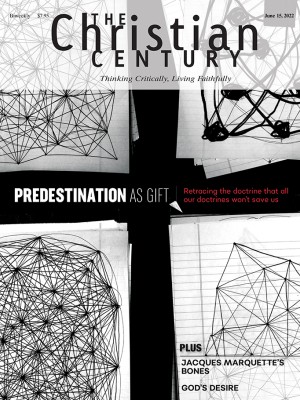June 26, Ordinary 13C (Luke 9:51–62)
No one who [fill in the blank] is fit for the kingdom. Ouch.
When no barbers were open for business in the summer of 2020, I cut my son’s curly hair on the steps of our front porch. The curls bounced and blew away to tangle with bushes or hide in the crevices of tree roots. Then in spring we saw them again, reinterpreted: the birds who made their nests in the trees of our yard had found my son’s locks and used them to cushion their twiggy abodes.
No one who [fill in the blank] is fit for the kingdom. Ouch. That’s never an inviting way to start or end a story. The words of Jesus in Luke 9 sound like a cutting-off. Either you can prioritize the work of the kingdom or not. If not, snip! You’re out.
Read our latest issue or browse back issues.
No one who [fill in the blank] belongs in the kingdom. This sentence has been completed by so many preachers, teachers, and theologians over the centuries who have sought to define what is central to the practice of our faith. What does following Jesus look like? It’s an essential question. But it has also been bent by hatred and levied in harmful, even violent ways, to the detriment of the kingdom. That pain and hurt is in the air when we read texts of judgment such as this.
Let us remember that Jesus speaks these words with his face “set toward Jerusalem.” There, with no place to lay his head but a cold tomb, he will work his most merciful deed. This “follow me or go home” moment moves Jesus closer to the cross. This ultimate experience of rejection for him will become an outpouring of mercy for all of creation: birds, foxes, fields, farmers, and those of us who failed to heed the call.
Maybe Jesus is looking for more of a trimming that leads to nest building rather than cutting people out. In Christ, our messy lives with all their competing allegiances become material that the good nest maker can use to build a home. Yes, we need to let some things go to focus on the way of Jesus. But it never ceases to amaze me what God can collect from within me and my community to use as building materials.
There is a housing crisis in the city where I live. I wish finding building materials to create shelter space and affordable housing was as simple as checking in the bushes and trees. Instead, folks who have nowhere else to go do sleep in the bushes in front of our church. But that is no cozy foxhole or bird nest. And our winters can be quite bitter. In sadness and disappointment, I am quick to blame city leaders and capitalist policies. But I too am a part of this community that has allowed people to freeze.
Foxes have warm, well-burrowed holes. Birds have nests made from the softest leaf, smoothest mud, curved twigs, and a random kid’s hair. But the Lord of heaven and earth has only us sinner/saints to make a home with.
Which is exactly what Jesus does. Especially in Luke, we follow Jesus as he moves about this earthly place to make an ever-expanding home in himself for the lost, the least, and the forsaken ones. In Jesus, God arrives in a world unready to welcome God. God journeys through all our reasons and excuses with God’s face set toward mercy. There is urgency to this homemaking work. The kingdom is coming soon. So let the dead bury the dead.
It sounds like Jesus has no time for good-byes, let alone funeral planning. And yet burying the dead is one way we proclaim the kingdom in the face of death. We point to our eternal home within the communion of saints, a home we experience even now, though not in full. Through baptism, we already are the dead (in Christ) who bury the dead. And in keeping those holy practices, we are following Jesus.
I believe a good funeral does the work of proclaiming the kingdom. What Jesus has no time for are our petty reasons for hesitating to answer the call to follow him. When the apocalypse is nigh, other stuff just doesn’t matter as much.
In an anxiety-ridden time such as this, cutting off is an attractive approach to those who don’t share our mission. Snip, you’re out. Or at the community level, split! Now our church is two warring factions in separate places rather than one diverse body with multiple perspectives. It is true that sometimes a boundary needs to be set. But Jesus has the capacity to cross every boundary and work even among those we can’t keep fellowship with.
When we place our trust in the one who has his face set to sacrificial love, our lives become hallowed as we remember our own mortality. We can entrust our beloved dead to the ground, where they will become compost for resurrection gardens. And if what has died is a church or ministry, we can pray that in dying it may provide building materials for the houseless.
As the living who are joined to Christ, the Living One, we collect the sacred remnants from trees and roots, stories and rituals to fashion new ways of being community together. Setting our face on Jesus, we can learn to practice rich welcome. We proclaim the Good News with every fiber of our being, especially seeking out those who have been cut off or cast down.
The saints at home forever in Jesus also remain among us. The signs of their presence, like a child’s curls in a bird’s nest, awaken us to the urgency of kingdom work while always rooting us in the promise of warm welcome in the body of Christ.





